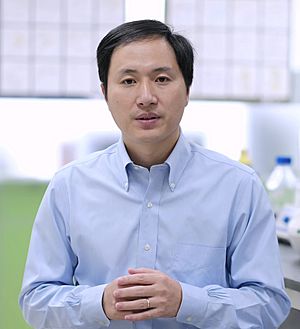He Jiankui facts for kids
Quick facts for kids
He Jiankui
|
|
|---|---|
| 贺建奎 | |

He in 2018
|
|
| Born | 1984 (age 40–41) Xinhua County, Hunan, China
|
| Alma mater | University of Science and Technology of China (BS) Rice University (PhD) |
| Known for | He Jiankui genome editing incident |
| Scientific career | |
| Fields | Biophysics |
| Institutions |
|
| Thesis | Spontaneous emergence of hierarchy in biological systems (2011) |
| Doctoral advisor | Michael W. Deem |
| Other academic advisors | Stephen Quake |
| He Jiankui | |||||||||
|---|---|---|---|---|---|---|---|---|---|
| Simplified Chinese | 贺建奎 | ||||||||
| Traditional Chinese | 賀建奎 | ||||||||
|
|||||||||
He Jiankui (born in 1984) is a Chinese biophysicist. He became widely known for his work in 2018. He was the first person to use gene editing on human babies. This work caused a lot of discussion and debate around the world.
He used to be a professor at the Southern University of Science and Technology (SUSTech) in China. In November 2018, he announced that he had created the first human babies with edited genes. These were twin girls, known as Lulu and Nana. They were born with changes meant to make them resistant to HIV, a virus that can harm the body's immune system.
At first, some people saw this as a big scientific step. However, many scientists and the public soon criticized how the experiment was done. An investigation showed that He Jiankui had raised money for his research to avoid rules set by the government and his university.
Because of this, Chinese authorities stopped his research activities in November 2018. His university also fired him in January 2019. In December 2019, a Chinese court found him guilty of practicing medicine illegally. He was sentenced to three years in prison and had to pay a large fine. He was released from prison in April 2022.
In February 2023, He Jiankui applied for a work visa in Hong Kong, which was first approved. But it was quickly taken back because he was suspected of giving false information in his application. In September 2023, he started working at the Wuchang University of Technology, a private college in China. He became the first director of their Genetic Medicine Institute.
Time magazine named him one of the 100 most influential people in 2019. But he was also called names like a "rogue scientist" or "China's Dr. Frankenstein" by some.
Early Life and Studies
He Jiankui was born in Xinhua County, China, in 1984. From 2002 to 2006, he studied quantum physics at the University of Science and Technology of China. He earned his degree in modern physics in 2006.
In 2007, he went to Rice University in the United States. There, he earned his PhD in biophysics in 2010. After getting his doctorate, he worked as a postdoctoral fellow at Stanford University from 2011 to 2012. During this time, he learned about the CRISPR/Cas9 gene-editing technique.
After the Incident
On February 21, 2023, a Hong Kong newspaper reported that He Jiankui's application for a Hong Kong entry permit was approved. But later that night, the Government of Hong Kong announced that his permit was invalid. They suspected he had made false statements in his application and started an investigation.
On September 8, 2023, the Wuchang University of Technology in China opened its Institute of Genetic Medicine. He Jiankui became its first director.
As of July 2025, He Jiankui is active on X, sharing updates about his genetic research in English. His posts have received various reactions online.
See also
 In Spanish: He Jiankui para niños
In Spanish: He Jiankui para niños
- Assisted reproduction technology
- Human Nature (a 2019 film about CRISPR)
- Unnatural Selection (a 2019 TV documentary)

